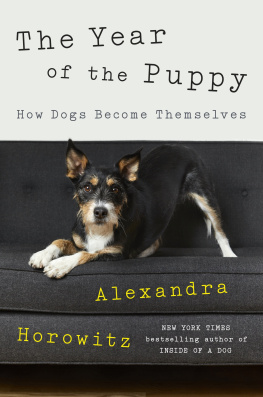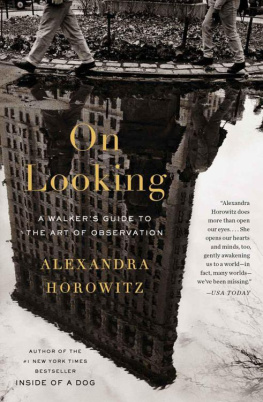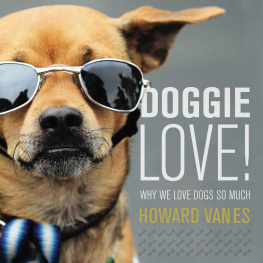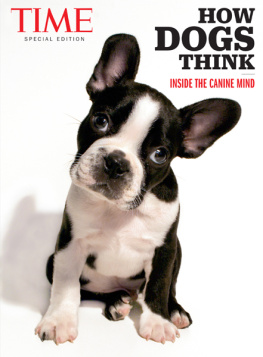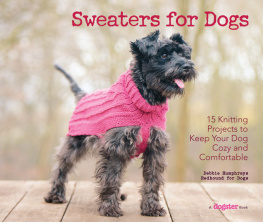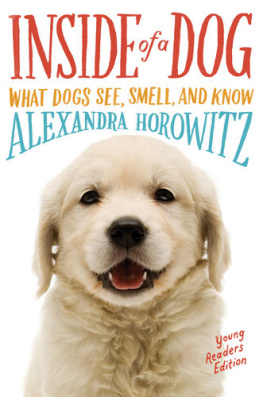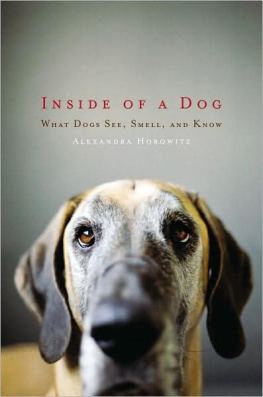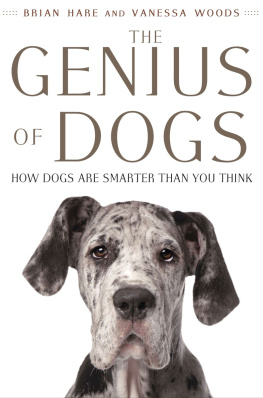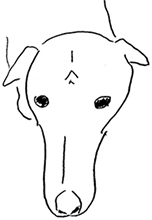
A LSO BY A LEXANDRA H OROWITZ
Inside of a Dog: What Dogs See, Smell, and Know
On Looking
Being a Dog: Following the Dog into a World of Smell

Scribner
An Imprint of Simon & Schuster, Inc.
1230 Avenue of the Americas
New York, NY 10020
www.SimonandSchuster.com
Copyright 2019 by Alexandra Horowitz, with illustrations by the author
All rights reserved, including the right to reproduce this book or portions thereof in any form whatsoever. For information, address Scribner Subsidiary Rights Department, 1230 Avenue of the Americas, New York, NY 10020.
FirstThis Scribner hardcoverexport edition September 2019
SCRIBNER and design are registered trademarks of The Gale Group, Inc., used under license by Simon & Schuster, Inc., the publisher of this work.
For information about special discounts for bulk purchases, please contact Simon & Schuster Special Sales at 1-866-506-1949800-268-3216 or .
The Simon & Schuster Speakers Bureau can bring authors to your live event. For more information or to book an event, contact the Simon & Schuster Speakers Bureau at 1-866-248-3049 or visit our website at www.simonspeakers.com.
Interior design by Erich Hobbing
Jacket design by David Litman
Jacket photograph by Maik Schmidt/Eyeem/Getty Images
Library of Congress Cataloging-in-Publication Data
Names: Horowitz, Alexandra, author.
Title: Our dogs, ourselves : the story of a singular bond / Alexandra Horowitz.
Description: New York : Scribner, 2019. | Includes bibliographical references.
Identifiers: LCCN 2019017043| ISBN 9781501175008 (hardcover) | ISBN 9781501175015 (paperback) | ISBN 9781501175022 (ebook)
Subjects: LCSH: Dogs. | Human-animal relationships. | Dog owners.
Classification: LCC SF426 .H64 2019 | DDC 636.7dc23
LC record available at https://lccn.loc.gov/2019017043
ISBN 978-1-5011-7500-8978-1-9821-3762-5
ISBN 978-1-5011-7502-2 (ebook)
For all the dogs who have been, are now, and are yet to be
Bonded

Once a dog has your heart, you are stuck: there is no undoing it. Scientists, ever unromantic, call it the dog-human bond. Bond captures not just the tight connection, but also the reciprocity; not just the mutuality, but also the affection. We love dogs and (we assume) are loved by them. We keep dogs but are also kept by them.
We could call it the human-dog bond, but then wed have our priorities wrong. The dog figures largely in the shorthand used to encapsulate the unique, symbiotic relationship between us and our pups. Most everything that the dog does serves to strengthen the connection: both effusive greetings and hopelessly bad behavior. The writing of E. B. White, who lived with over a dozen dogs through his lifemany known to the readers of his pieces in the New Yorker exemplified the humanity that the bond allows us to grant to dogs. When Americans heard that Russia was going to send a dog into space, White reasoned he knew why: The little moon is incomplete without a dog to bay at it.
Or, it may just be assumed that if were going to the moon, well want to bring our constant companions with us. They have been by our sides for thousands of years before we dreamed of traveling into spacebefore not just rockets, but every technological step that produced them, from metalworking to motor making. Before we were living in citiesbefore any of the recognizable elements of contemporary civilization were in placewe were living alongside dogs.
When early humans unconsciously made the decision to begin domesticating the wolves around them, they changed the course of the species development. And, too, when each person makes the decision to breed, buy, or rescue a dog, we enter into a relationship that will change us. It changes the course of our days: dogs need to be walked, fed, attended to. It changes the course of our lives: dogs weave their way into our psyches with their steady presence by our sides. It has changed the course of Homo sapiens.
The story of dogs and humans has even led, in the twenty-first century, to the appearance of humans who research dog cognition. This is where I come in: my job is observing and studying dogs. Not petting; not playing with; not just looking fondly at. It comes as a great disappointment to those who apply to work with me in the Dog Cognition Lab that we do not keep puppies nor do we even touch puppies as part of our work.questions like whether dogs can sniff out a small difference in food, or whether they prefer one odor over anotherany people in the room with the dog have to make themselves completely boring to the dogs. This means: no talking to, cooing over, calling, or responding to a dog; no sharing adoring gazes with or tickling under the chin of the dog. Sometimes we wear sunglasses in their presence or turn our backs should a dog look to us for any reason. In other words, in the experimental room with dogs we fall somewhere between acting like trees and acting inexcusably rude.
We are not aloof; its just hard enough to see whats happening without being part of whats happening. Since the tools animal-behavior researchers useeyesare those we use for other means, it can be hard to tune them to see the behavior in front of us, rather than what we expect to see.
That said, humans are natural animal observers. Historically, we had to be. To elude predators, or to hunt prey, our hominid ancestors had to watch what animals were doing, to notice the appearance of something new moving in the grass or trees: it affected them. Their skill at watching was the difference between getting dinner and being dinner. Hence my job turns evolutions job on its head: Im not looking for the newest element of a scene. Instead, I aim to look at that which we mostly ignorethat with which were most familiarand to see it again in a new way.
I study dogs because Im interested in dogsnot just for what dogs can tell us about humans. Still, every aspect of looking closely at dog behavior has a human component. We look at our dogslooking back at us wagginglyand wonder about ancient humans who met their first proto-dogs. We ask the questions of dog mind that we do because of our interest in the workings of our own minds. We examine how dogs react to usso differently than other species do. We wonder what effect living with dogs has on our society, salutary or damaging. We gaze into dogs eyes and want to know who dogs see when they gaze back. Our lifestyle with dogs and our science of dogs both reflect human interests.
While considering dogs scientifically, I have become more and more alert to the culture of dogdom. Dogs come to our lab with their owners, and though we are often only looking at the behavior of the quadrupedal member of that pair, the dog-owner relationship is the elephant in the room. As someone who has always lived with dogs, it is the very culture that I am immersed in; but I began to see it more clearly from the perspective of an outsider, wearing my scientists hat. The ways we acquire, name, train, raise, treat, talk to, and see our dogs deserve more attention. Dogs can slip from being bonded to us to being bound by us. Much of what we accept as the way to live with dogs is odd, surprising, revelatory, even disturbingand contradictory.
Next page

